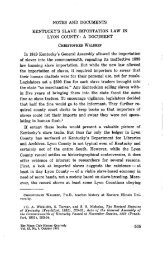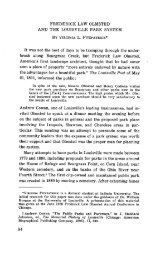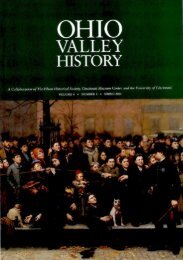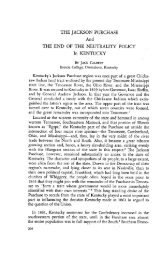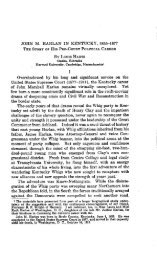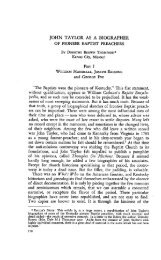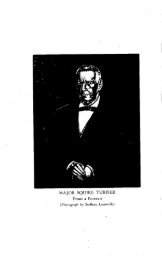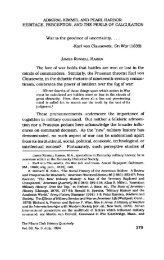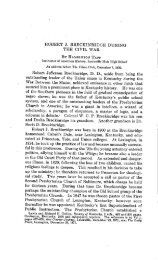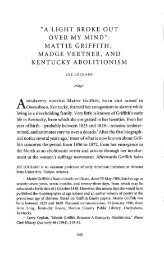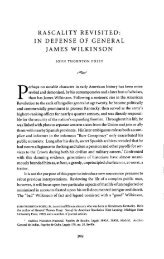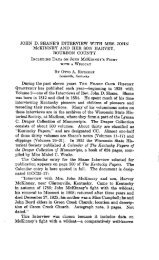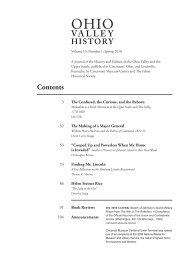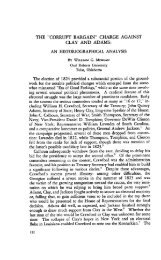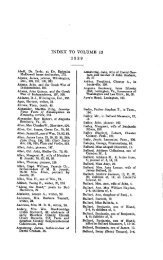The Lexington Civic League: Agent of Reform, 1900 - The Filson ...
The Lexington Civic League: Agent of Reform, 1900 - The Filson ...
The Lexington Civic League: Agent of Reform, 1900 - The Filson ...
Create successful ePaper yourself
Turn your PDF publications into a flip-book with our unique Google optimized e-Paper software.
344 <strong>The</strong> <strong>Filson</strong> Club History Quarterly [July<br />
twelve supervisors hired by the city. <strong>The</strong> <strong>League</strong> remained active<br />
in directing these parks and playgrounds with help from the<br />
city until 1927 when they were made a department <strong>of</strong> the municipal<br />
government.l<br />
Members <strong>of</strong> the <strong>Civic</strong> <strong>League</strong> also recognized the need for<br />
various kinds <strong>of</strong> improvements in the field <strong>of</strong> education. Mrs.<br />
Breckinridge spoke to the school board in December 1902 asking<br />
that manual or vocational training be initiated in all the public<br />
schools. <strong>The</strong> board responded by appointing a committee to<br />
study the possibility. Encouraged by this action, the <strong>League</strong><br />
dramatized its interest in education by bringing to <strong>Lexington</strong><br />
Jane Addams, the famed Hull House reformer, to speak on<br />
"New Ideals in Education." In a speech, given on the campus <strong>of</strong><br />
Kentucky University (now Transylvania University), on 14<br />
May 1903, she called for an end to child labor, for the introduction<br />
<strong>of</strong> manual training in the schools, and for playgrounds and<br />
kindergartens.lS<br />
Publicity for manual training continued as the <strong>League</strong> brought<br />
Judge Ben B. Lindsey <strong>of</strong> Denver, Colorado, a pioneer in the<br />
development <strong>of</strong> the juvenile court system, to <strong>Lexington</strong> in 1905.<br />
In an address at the Opera House on 30 January and at the<br />
Courthouse on the following day, Lindsey spoke on "Manual<br />
Training as a Preventive <strong>of</strong> Delinquency in Children," arguing<br />
for the benefits <strong>of</strong> both manual training and a juvenile court<br />
system. One reason why children got into trouble, he said, was<br />
because they could not find employment. Manual training schools,<br />
he contended, were "moral hospitals" which would train children<br />
for a job and thereby keep them out <strong>of</strong> trouble.1<br />
17 Wright, <strong>Lexington</strong>, 10O; <strong>Lexington</strong> Herald, 11, 13 July, 8 September<br />
1902, 30 January, 31 May, 1 April, 2, 14, 30 June, 30 August 1903, 27 April,<br />
1O, 26 June, 31 August, 5 September, 20 November 1904; Florence Shelby<br />
Cantrill, "Among My Souvenirs," unpublished autobiography in possession<br />
<strong>of</strong> Mrs. Florence Tabling, <strong>Lexington</strong>, 90. For a brief history <strong>of</strong> the<br />
traveling Chautauqua groups which provided lectures, concerts, and recitals<br />
around the country, see World Book Encyclopedia (Chicago: World<br />
Book, 1984), 3:301.<br />
18 <strong>Lexington</strong> Herald, 30 June, 4 July, 5 December 1902, 12, 13, 14 May<br />
1903. -<br />
19 Ibid., 31 January, 1 February 1905; "Reports <strong>of</strong> Hon. Ben B. Lindsey,



